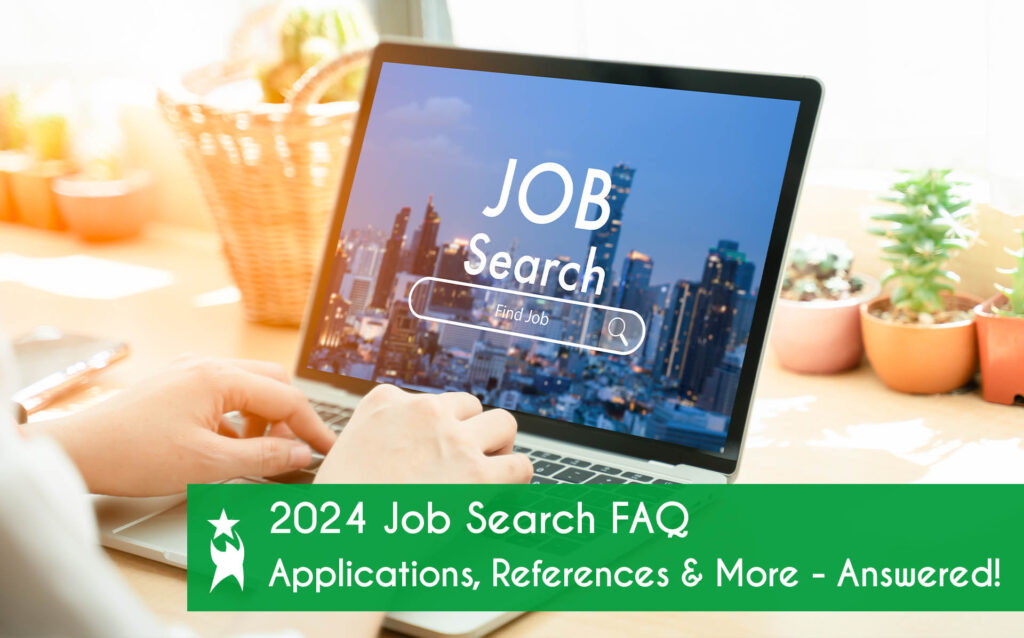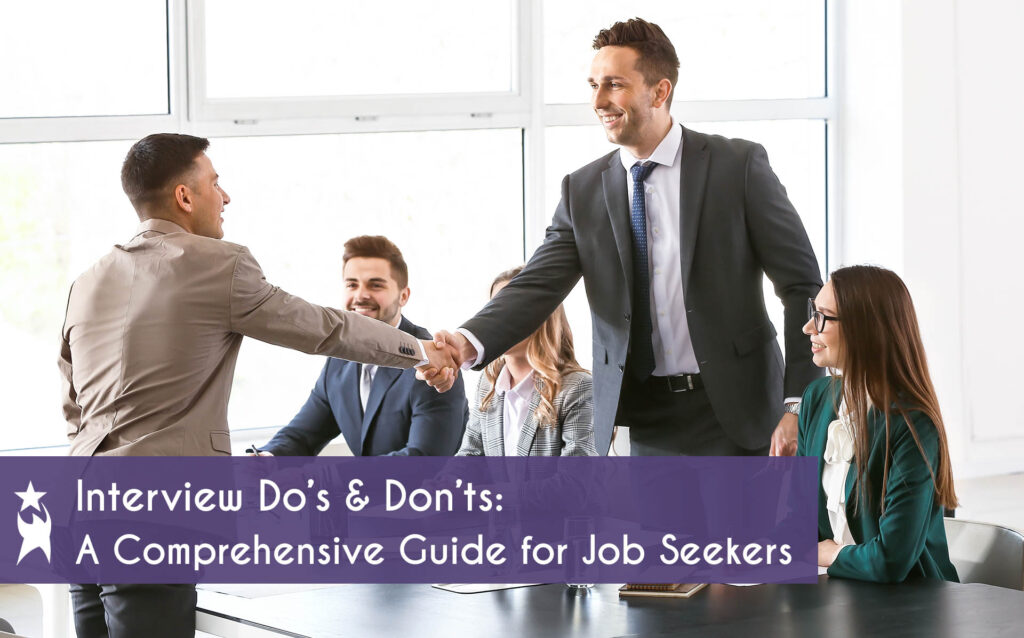The job search process can be confusing and bring up a lot of questions. From figuring out what information goes on an application to understanding what employers are allowed to ask, it’s easy to feel lost. We’ll tackle job seekers’ most common questions in this FAQ guide. From uncovering hidden jobs to tricky application questions and choosing the right references, this guide will equip you with the knowledge you need to navigate your job search with confidence.
Job Search: Where are all the good jobs?
Landing your dream job starts with finding the right opportunities. Here’s the lowdown on popular avenues to explore:
Q: Where can I find job opportunities?
A: The job search landscape offers a variety of resources. Here are some key places to start:
- Online Job Boards: Major players like Indeed, LinkedIn, and Glassdoor list a vast array of openings across industries. You can filter by location, job title, and company to find the perfect fit.
- Company Career Pages: Many companies advertise open positions directly on their websites. Check the “Careers” section of companies you’re interested in – you might find your dream job just a click away!
- Staffing Agencies: These agencies specialize in connecting job seekers with temporary, temp-to-hire, and permanent positions. They typically focus on specific industries, so research agencies aligned with your career goals.
Q: Which jobs pay weekly?
A: Temporary and temp-to-hire positions through staffing agencies often offer weekly paychecks. This can be a great option if you need a steady cash flow while exploring career options. Staffing agencies handle payroll, so you receive your wages directly from them, typically on a weekly or bi-weekly basis.
Q: How do you work with a recruiter for a job search?
A: Job recruiters act as matchmakers between employers and potential candidates. They typically specialize in specific industries or job types and source qualified candidates for open positions. Here’s what you need to know about working with a recruiter:

- Recruiters Get Paid by Employers: Don’t worry, you won’t have to pay a fee to work with a recruiter! Their services are typically covered by the companies seeking to fill open positions.
- They Advocate for You: A good recruiter will take the time to understand your skills and career goals to find the perfect fit. They can also help polish your resume and prepare you for job interviews.
Q: How do job fairs work?
A: Job fairs are events where companies gather to meet potential candidates. They are a great way to network with employers face-to-face, learn about different companies and positions, and potentially land an interview on the spot. Here’s how to make the most of a job fair:
- Research Participating Companies: Before attending, identify companies that align with your interests. Prepare a concise elevator pitch highlighting your skills and experience.
- Bring Resumes & Dress Professionally: Have plenty of copies of your resume and dress professionally to make a good first impression.
- Follow Up After the Fair: Connect with companies you’re interested in on LinkedIn or send a follow-up email expressing your interest in specific positions.
Job Search & Applications: Can They Ask That?!
The job application process can raise questions about what employers are allowed to ask. Here’s a breakdown of some common questions, focusing on regulations in Washington State.
Q: Can a job application ask for my SSN?
A: In Washington, employers can’t request your Social Security Number (SSN) on the initial application. They can legally ask for it later in the hiring process, typically during the onboarding process after a conditional offer has been made. Employers use your SSN for purposes like tax withholding and identification verification.
Q: Can a job application ask my age?
A: Washington state law prohibits employers from discriminating based on age. While an application might ask for your date of birth, it can’t be used to disqualify you based on age. However, there are some legal exceptions where a minimum age requirement might apply, such as jobs with age restrictions by law (for example, serving alcohol).
Q: Can a job test for weed?
A: Washington legalized recreational marijuana use. Employers can generally conduct pre-employment drug tests, but they cannot discriminate against qualified applicants based solely on the presence of cannabis metabolites in their system, unless the position falls under specific exceptions outlined by the state.

Q: Can a job require a COVID vaccine?
A: Currently, there is no state law in Washington mandating COVID-19 vaccination for employment. However, employers can have their own vaccination policies, which may include requiring vaccination as a condition of employment. It’s important to check with the specific employer about their policy.
Important Note: Employment laws can be complex and constantly evolving, and employment laws and regulations can vary by location. This blog post provides general information only. For the most up-to-date information on your rights as a job seeker in Washington, consider contacting the Washington State Department of Labor & Industries or seeking guidance from an employment lawyer in your jurisdiction.

Q: Can jobs detect if I used ChatGPT on my resume or cover letter?
While there’s no guaranteed way for employers to definitively detect ChatGPT use in your application materials, relying on AI-generated content can backfire. ChatGPT text, while creative, might lack the specific industry keywords or relevant details recruiters typically look for. Here are some tips to leverage AI tools effectively:
Brainstorming: Use ChatGPT to spark ideas for your resume and cover letter. Let it generate different phrasings or highlight relevant skills you might forget to mention.
Keyword Inspiration: Input keywords from the job description into ChatGPT and see how it incorporates them. This can help you identify relevant industry terms to integrate into your own writing.
Proofread and Tailor: Consider using AI editing tools to check for grammar or typos. However, never rely solely on them. Always proofread your application materials yourself and tailor them to the specific job description using your own words and experiences.
I applied... Now what?
So you’ve submitted your application – congratulations on taking that first step! Now you might be wondering what happens next. Here are some FAQs to guide you:
Q: Will a job leave a voicemail if they're interested?
A: Not necessarily. Companies use different communication styles. Some might leave a voicemail, especially early in the interview process, but others prefer email or online scheduling tools. The best approach is to follow up after a week or so if you haven’t heard back. A polite email expressing continued interest in the position can show your enthusiasm.

Q: What are some important things to consider after applying for a job?
Here are some key things to keep in mind:
- Stay Organized: Track the jobs you’ve applied for, including company names, contact information, and the date you submitted your application. This will help you stay on top of potential interviews and follow-up opportunities.
- Prepare for Interviews: Research the company and the position beforehand. You can often find valuable information on their website or social media pages. Anticipate common interview questions and practice your responses.
- Network: Don’t underestimate the power of networking! Connect with professionals in your field on LinkedIn or attend industry events. Building relationships can open doors to new opportunities.
- Be Patient: The job search can take time. Don’t get discouraged if you don’t hear back immediately. Keep applying for positions that align with your skills and interests, and use the waiting period to continue developing your skills.

Q: Should I follow up after applying for a job?
A: Absolutely! Following up after a week or so of submitting your application is good practice and can help your application stand out. Send a polite email to the hiring manager or recruiter expressing your continued interest in the position and reiterating your qualifications. Here are a few tips to make your follow-up effective:
- Timing is key: Don’t follow up immediately after submitting your application. Give the hiring manager or recruiter some time to review applications (usually a week or so).
- Personalize it: Address your email to the hiring manager or recruiter by name if possible (check the company website or job listing). Briefly re-introduce yourself and the position you applied for.
- Express enthusiasm: Thank them for their time and consideration. Reiterate your key qualifications and why you’re a strong fit for the role. You can mention something specific from the job description that excites you or how your skills can benefit the company.
- Keep it concise: Your follow-up email should be brief and to the point. Aim for 3-4 concise sentences.
- Proofread: Ensure your email is free of typos and grammatical errors.

Q: What happens if I receive a job offer but the salary isn't what I expected?
A: Salary negotiation typically occurs after receiving a job offer. Here are some tips for approaching the situation if the salary isn’t what you expected:
- Research: Before the conversation, research average salaries for the position in your area, considering factors like your experience level, the company size, and industry standards. Resources like Salary.com or Glassdoor can be helpful starting points.
- Keep it professional: Negotiation is a normal part of the hiring process. Approach the conversation with confidence and professionalism. Thank the employer for the offer and express your enthusiasm for the position.
- Focus on value: Explain why you deserve the salary you’re requesting. Highlight your skills, experience, and the value you can bring to the company. You can mention your research on average salaries to support your request.
- Be prepared to walk away: Know your bottom line – the minimum salary you’d be willing to accept. Be prepared to walk away from the offer if the company can’t meet your expectations.
Q: How should I handle rejection during the job search?
A: Rejection is a normal part of the job search process. Don’t get discouraged! Review your application materials and consider where you might improve for future opportunities. You can also learn from the interview experience by reflecting on the questions you were asked and how you responded.
- Allow yourself to feel disappointed: It’s okay to feel bummed! Acknowledge your emotions, but don’t dwell on them.
- Take time to reflect: Review your application materials and consider where you might improve. Analyze the interview experience, if you had one. Reflect on the questions you were asked and how you responded. Were there areas where you could have provided stronger answers? Could your resume be tailored more effectively to the specific requirements of the position?
- Learn from experience: Use this as a learning opportunity. What did you learn from the application process or interview?
- Stay positive: Don’t let rejection defeat you. Stay positive and focus on the next opportunity. Keep applying for jobs that align with your skills and interests.
- Network: Connect with professionals in your field. Attend industry events or join online communities. Building relationships can open doors to new opportunities and provide valuable insights into the job market.
- Work with a recruiter: Recruiters with staffing agencies specialize in connecting job seekers with employers. They can provide guidance on your resume and interview skills and can also advocate for you during the negotiation process. They can also provide insider feedback on rejections to help you improve your candidacy.
- Develop additional skills: During your job search, consider taking online courses or workshops to develop new skills or enhance your existing skillset. This will not only make you a more attractive candidate but can also boost your confidence.
Job Search & Background Checks: What Can Employers Actually Dig Up?
Landing a job offer is exciting! But before you start celebrating, there’s often one more hurdle: the background check. Here’s a breakdown of some common questions to ease your anxieties.
Q: How do background checks Work?
A: Background checks typically involve verifying information you’ve provided on your application, such as your employment history, education, and references. Companies may use a background check service that searches public records for information relevant to the position. Here’s a breakdown of what they might check:

- Criminal History: In most cases, employers can conduct a criminal background check with your written permission. This typically involves a search of local, state, and sometimes national databases for any criminal convictions or arrests. The Fair Credit Reporting Act (FCRA) regulates how employers can use background check reports, and they are required to provide you with a copy of the report if it’s used to make a negative decision about your employment.
- Employment History: Employers will likely contact your past employers to verify your dates of employment, job title, and responsibilities. They may also seek feedback on your performance and work ethic.
- Education Verification: As mentioned earlier, employers generally cannot access your GPA without your permission. However, they may confirm your attendance and degree completion by contacting your educational institutions.
- Motor Vehicle Records (MVR): If the job requires driving, employers may check your driving record with your permission. This can reveal information about past traffic violations, accidents, and license suspensions.
Important Note: Laws around background checks can vary by state. It’s always best to consult with an employment lawyer if you have specific concerns about the background check process.
Bonus Tip
Even if transcripts aren’t explicitly required, consider including relevant coursework or projects on your resume that demonstrate your skills and knowledge for the position. This can be especially helpful if you have limited work experience to showcase.
Q: Can jobs check my GPA?
A: Not without written permission. Federal privacy laws prevent universities from releasing your academic transcript or GPA information to third parties (like potential employers) without your written consent. So, unless you explicitly authorize it on your application or a separate release form, employers cannot access your GPA through official university channels. However, employers may attempt to verify your graduation status through other means, like public databases or verification services.
Q: Will jobs ask for my transcripts?
A: Probably not. In most cases, entry-level jobs won’t require official transcripts. Employers for these positions typically rely on your resume and cover letter to assess your skills and experience. They may place more emphasis on your soft skills, relevant coursework, and any internships or volunteer work you’ve completed.
Exceptions for Transcripts:
There are a few exceptions where even entry-level jobs might ask for transcripts:
- Highly Specialized Fields: If the job requires a specific degree or certification in a technical field (e.g., engineering, nursing), the employer might request transcripts to verify your coursework and completion of the program.
- Academic or Research Positions: Research assistant or entry-level teaching positions might require transcripts to assess your academic performance and suitability for the role.
- Government Jobs: Some government agencies might have stricter requirements and request transcripts for certain entry-level positions, especially those requiring specific degrees or majors.
As a general rule, it’s always best to check the job description carefully. The description will often mention any required documents, such as transcripts. If unsure, don’t hesitate to reach out to the hiring manager or recruiter to clarify their requirements.
Securing Strong References for your job search
Choosing strong references who can highlight your skills and work ethic can boost your application. This section answers some frequently asked questions about references so you’ll be ready when the time comes.
Craft a Polite Email: Send a polite and professionally worded email to ask about the status of your application. It’s ok to request information on when you can expect to hear back about the next steps in the hiring process but remember to be concise, professional and respectful.
Reiterate Your Interest: Briefly mention that you’re still interested in the position and the company and remind them why you’re a good fit for the role.
Express Flexibility: Convey your flexibility and understanding of the process. Express that you are willing to provide additional information if needed.
Q: When do jobs ask for references?
A: Employers typically ask for references later in the hiring process, after they’ve narrowed down the candidate pool. This often happens after a strong initial interview or if you’ve emerged as a frontrunner for the position. Here’s how to find out if references are required:
- Check the job description: Many job postings will explicitly state whether references are needed.
- Near the end of the interview (optional): Once the interviewer has finished asking their questions and you’ve had a chance to showcase your skills and experience, you can ask a brief question like: “Is there anything else I can provide to help you with the application process at this stage?”
Remember: It’s important to be respectful of the interviewer’s time. Avoid asking about references at the beginning of the interview, or if the interviewer seems pressed for time.
Q: Can job references be friends?
A: While friends can be enthusiastic about your personality, it’s usually better to use professional references who can speak to your work ethic and skills. Ideal references include:
- Former supervisors or managers: These individuals have firsthand experience with your job performance and can provide valuable insights to potential employers.
- Colleagues from previous jobs: Co-workers who collaborated with you on projects can speak to your teamwork abilities and specific skills.
- Professors or instructors (for recent graduates): If you’re new to the workforce, professors who oversaw your academic work and relevant projects can be strong references.

Here are some references options for first-time job seekers who might not have traditional work experience yet:
- Internship & Odd-Jobs: Mowing lawns, babysitting, freelance work, and internships all count as experience! Even unpaid odd-jobs and internships can provide valuable references. They show responsibility, time management, and the ability to follow instructions – all important qualities in the workplace.
- Volunteer Supervisors or Coordinators: If you’ve volunteered, the people who oversaw your work can be excellent references. They can speak to your reliability, teamwork skills, and work ethic in a professional setting.
- Teachers or Coaches: Teachers who know you well from relevant coursework or project-based learning can vouch for your skills and ability to learn. For example, if you’re applying for a customer service role, a teacher who witnessed your communication and problem-solving skills in a group project could be a strong reference.
- Leaders from extracurricular activities: Did you participate in clubs, sports teams, or other extracurricular activities? Leaders or coaches can be good references, especially if they oversaw projects where you demonstrated relevant skills like leadership, communication, or time management.

Q: How can I prepare references for a job search?
A: Once you’ve identified strong potential references who fit the job description, here’s how to get them on board and ensure they can give you the best possible recommendation:
- Ask for Permission: Always get permission before listing someone as a reference. A quick email or phone call is a good way to do this. Briefly explain the position you’re applying for and why you consider them a strong reference.
- Give Them a Heads-Up: Don’t leave your references in the dark! Briefly inform them about the potential job and the type of questions a potential employer might ask. This could include highlighting specific skills or experiences you mentioned in your interview that your reference can vouch for.
Q: Will jobs call my previous employers?
A: Yes, in most cases, employers will likely try to contact your previous employers, especially your most recent supervisor. This is a standard way to verify your employment history and gain insights into your work style and performance. Here are some tips to navigate this situation, whether you’re comfortable with your current employer being contacted or not:
For Job Seekers Comfortable with Contacting Current Employer:
- Strong Current Reference: If you have a positive relationship with your current employer and they can speak highly of your skills and work ethic, prioritize listing them as a reference. This can significantly strengthen your application.
- Prepare Your Current Employer (Optional): If you’d like to give your current employer a heads-up about your job search, you can have a brief conversation explaining you’re exploring new opportunities while still valuing your current role.
For Job Seekers with Concerns About Contacting Current Employer:
Focus on Past Experiences: If you have references from previous jobs relevant to the position you’re applying for, prioritize listing them. Strong references from past roles can lessen the need to contact your current employer.
Limited Past Employment: If your current employer is your only past reference and you’d prefer to keep your search confidential, explore these options:
- Alternative References: Seek references who can speak to your skills and work ethic, such as:
- Volunteer Supervisors: People who oversaw volunteer work.
- Teachers or Professors (for recent graduates): Instructors familiar with your relevant coursework.
- Clients or Customers (For Freelance Work): Satisfied clients can be strong advocates.
- Former Co-Workers: Past colleagues who no longer work at the same company can be excellent references. They can verify your employment dates and speak to your work ethic and skills you demonstrated on the job.
- Network Strategically: Build connections in your field through industry events or online communities. These connections can be valuable references in the future, reducing reliance on your current employer.
Beyond the Boss: Leveraging Former Co-Workers for Strong Job Search References:
- Choose Carefully: Select former colleagues who can genuinely speak to your strengths and qualifications relevant to the job you’re applying for.
- Verify Contact Information: Ensure you have their current contact details (phone number and email address) before listing them as a reference.
- Explain the Situation (Optional): If there’s a chance your former employer might still be connected to your co-worker, you can briefly explain your situation (confidential job search) and ask if they’d be comfortable being a reference without jeopardizing their own professional standing.
Disclaimer: This blog post is not intended to be a substitute for professional legal advice. The laws and regulations surrounding employment can vary depending on your location. For specific legal questions or concerns, we recommend consulting with a qualified attorney in your jurisdiction.
Got questions about your career? We’re always happy to answer questions from our readers, so send them our way!
Check out our other blog posts for more useful tips!
Resources
- Throwing Flags: Interview Mistakes That Could Cost You the Job
- Seal the Deal: Turn That Successful Interview into a Job Offer
- From Hanger to Hired: Dress for Success to Land the Job
- Telling Tales: Using Storytelling to Land the Job You Want
- WOW Your Interviewer With These Next-Level Nonverbal Communication Tips








